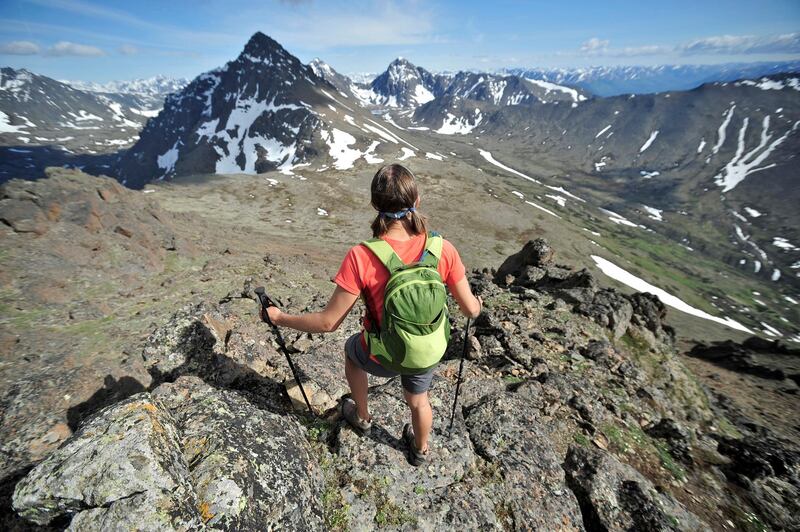We’re all familiar with the figure of the man who turns his back on civilisation, shunning society to live alone in the wild. His goal might be to exist as one with nature in a search for some kind of spiritual transcendence, as in Henry David Thoreau’s famous foray into the woods back in the 1840s.
Or perhaps he's in search of an adventure like The Call of the Wild author Jack London who chanced it in the Klondike Gold Rush at the turn of the last century. Then there's the likes of Bear Grylls, a man who has made a living out of wilderness survival television shows.
Less well known, however, are the women who have ventured out into the wild; namely because they haven’t.
There are exceptions to the rule, of course, as Erin, the 19-year-old protagonist of Abi Andrews’s debut novel, points out: cowgirl Calamity Jane; Nellie Bly, who went around the world in 72 days; explorer Freya Stark, whose travels in the Middle East took her through deserts then as yet uncharted by any outsider; Mary Kingsley’s Victorian travels through West Africa; “and that old lady who went over Niagara Falls in a wooden barrel”.
Though she has been brought up in the urban north of England, Erin can hear the call of the wild and she’s longing to follow in London’s footsteps to the United States’ northernmost state. She wants to feel like she’s “small and getting smaller”, just one tiny dot on our 4.5 billion-year-old planet, and “Alaska is the place to feel this”, she explains. “It figures in the collective psyche as the Land of the Mountain Men, the Last Great Wilderness. It is big and vast and mostly unpeopled.”
Getting there isn't the problem. Sure, her parents aren't keen on her heading off into the woods 6,437 kilometres away, but Erin is legally an adult now. She's also not deterred by their refusal to contribute financially to her plan; she simply gets a job after her A-Levels and saves up enough for her journey. If she needs more, she figures she can earn as she travels.
She certainly isn’t going to let prejudices or preconceptions stand in her way, despite what people say: “because a girl wanting to shun modern society and go AWOL into the wilderness to live by killing and eating small animals and scavenged plants would just be considered unsettling”.
Why should her gender bar her from the adventure she wants? Short answer: it’s not going to. “Travelling by sea and land” – the UK to Iceland, then on to Greenland and Canada, and across into Alaska – “it will be an Odyssean epic, only with me, a girl, on a female quest for authenticity.”
Publishers are describing The Word for Woman is Wilderness a feminist adventure story, and it is, but it's very much a thinking woman's adventure story too. You certainly don't have to be a nature freak or a wilderness nut to be able to enjoy Erin's explorations. I was entranced by Andrews's descriptions of barren snowy wastes, Erin's moving encounter with a bear and the vision of a sunset from a mountain top looking out across the Alaskan tundra.
Andrews’s novel, however, is much more than just an account of her protagonist’s physical trials. Erin’s journey is as much an intellectual one, an opportunity for her to meditate on a vast array of questions and subjects – philosophical, creative and scientific – from the moon landings to the wonders of mycelium, from solitude to sexual assault.
It's a novel disguised as non-fiction; or, since these essay-like meditations don't feel like digressions from the plot, but rather completely integral to Andrews's project, perhaps that should be non-fiction disguised as a novel. An additional layer of complexity is found in the fact that it's written, and presented as a memoir. It includes sketches as from Erin's notebooks, photographs we're to believe were taken along the way, and even transcripts of certain conversations she has with people she meets (she initially sets out to make a documentary of her trip). So convincingly so, that about halfway through I had to double check I'd understood Andrews's intentions correctly.
It’s very clearly not a project that has been hastily thrown together as a response to the current moment – the grace and reflection of Andrews’s prose proves otherwise – but nevertheless its publication is serendipitously timely.
“Wildness in women does not mean autonomy and freedom; their wildness is instead an irrational fever,” muses Erin. “Simultaneously, in survivalist terms we are the weaker sex and cannot prosper individually outside of the social sphere or without the protection of a manly man. Women both are excluded from, and banished to, nature.”
By means of ever-increasing circles of ideas, Andrews continually returns to this central problem – that of woman’s supposed affinity with, but rejection from the glories of the natural world. Not any more though. This beautiful, thoughtful, and often humorous novel readdresses the balance of biology: “But man says I am civilised, and the rest is woman and wilderness.”
________________
Read more:
[ Banthology: Stories from the nations that Trump did not want ]
[ 'I am not afraid of being a pariah': Leila Slimani explores the darker side of parenting ]
[ The most-anticipated Egyptian novels: A day at the Cairo book fair ]
________________





